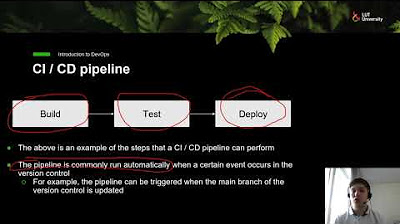The Essence of DevOps: Stages, Principles and Benefits
Summary
TLDRThis video explores the essential role of DevOps in modern software development, emphasizing the need for collaboration between development and operations teams. By breaking down the traditional development cycle into smaller, manageable chunks, DevOps enables faster coding, testing, and deployment, ultimately allowing businesses to respond swiftly to customer needs. The principles of culture, automation, measurement, and sharing are highlighted as critical for successful implementation. With a focus on continuous delivery and feedback loops, the video showcases how adopting DevOps practices can enhance speed, reliability, and communication, leading to a more agile and efficient software development process.
Takeaways
- 🚀 DevOps accelerates software development by fostering collaboration between development and operations teams.
- 📏 The software development process is divided into five key stages: planning, coding, testing, deployment, and operations/feedback.
- 🔗 DevOps is an extension of agile methodology, emphasizing iterative development and flexibility to changes.
- 🤝 The culture of shared responsibilities between teams enhances understanding of both development and production requirements.
- ⚙️ Automation is crucial in DevOps, allowing for continuous integration and delivery of code with minimal manual effort.
- 🔍 Continuous monitoring and feedback loops are essential for maintaining code quality and understanding application performance.
- 💡 Smaller code chunks are easier to test and deploy, leading to quicker identification and resolution of bugs.
- 📈 DevOps practices enable consistent reliability by leveraging automated testing and version control systems.
- ☁️ Cloud infrastructure integration with DevOps allows for easier scaling to meet fluctuating computing demands.
- 📊 Communication and a business-oriented mindset within teams are vital for successful collaboration and project outcomes.
Q & A
What is the primary focus of DevOps?
-The primary focus of DevOps is to enhance collaboration between development and operations teams, enabling faster and more reliable software development and deployment.
How does DevOps relate to agile methodologies?
-DevOps is considered a natural extension of agile methodologies, as both promote close collaboration and iterative processes in software development.
What are the five stages of software product development in DevOps?
-The five stages of software product development in DevOps are planning and product design, coding, testing, deployment, and operations and feedback gathering.
What is the significance of using smaller chunks of code in DevOps?
-Using smaller chunks of code allows for more frequent releases, quicker testing, and faster feedback from production, which ultimately enhances the overall development speed and product quality.
What does the acronym CAMPS stand for in the context of DevOps?
-CAMPS stands for Culture, Automation, Measurement, and Sharing, which are the essential principles of DevOps.
Why is culture important in DevOps?
-Culture is crucial in DevOps because it encourages shared responsibilities between production and development teams, fosters communication, and aligns team members with business objectives.
What are Continuous Delivery and Continuous Integration?
-Continuous Delivery and Continuous Integration are practices in DevOps that facilitate the constant pushing of code to testing and production, allowing for frequent updates and reducing the risks associated with large deployments.
How does automation benefit the DevOps pipeline?
-Automation in the DevOps pipeline reduces the need for manual effort in testing, integration, deployment, and monitoring, leading to increased efficiency and faster release cycles.
What examples were given to illustrate the impact of DevOps on deployment frequency?
-The examples include Preplea, which reported over 100 deployments a day, and Amazon, which deployed code every 11.6 seconds after implementing DevOps practices.
What are the benefits of having feedback loops in DevOps?
-Feedback loops in DevOps provide valuable insights into production performance, enabling teams to quickly identify and fix issues, as well as evaluate the effectiveness of code changes.
Outlines

Cette section est réservée aux utilisateurs payants. Améliorez votre compte pour accéder à cette section.
Améliorer maintenantMindmap

Cette section est réservée aux utilisateurs payants. Améliorez votre compte pour accéder à cette section.
Améliorer maintenantKeywords

Cette section est réservée aux utilisateurs payants. Améliorez votre compte pour accéder à cette section.
Améliorer maintenantHighlights

Cette section est réservée aux utilisateurs payants. Améliorez votre compte pour accéder à cette section.
Améliorer maintenantTranscripts

Cette section est réservée aux utilisateurs payants. Améliorez votre compte pour accéder à cette section.
Améliorer maintenantVoir Plus de Vidéos Connexes

What is DevOps? - DevOps explanation by WebGentle | Explained Dev

DevOps & Continuous Delivery Lifecycle Explained

What does DevOps engineer mean to you?

Introduction to DevOps - CI / CD

Software Development Life Cycle: Explained

DevOps In 5 Minutes | What Is DevOps?| DevOps Explained | DevOps Tutorial For Beginners |Simplilearn
5.0 / 5 (0 votes)
